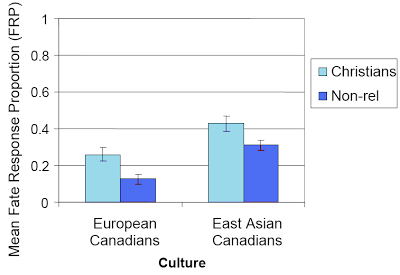Christians tend to be more fatalistic than the non-religious, which is not altogether surprising. In a post earlier this month I reviewed a study showing one of the consequences of that fatalism.
This post is about an altogether weirder aspect of fatalism!
It comes from a study by Ara Norenzayan (University of British Columbia) and Albert Lee (Queen’s University, Ontario). They looked at religious students and found, lo and behold, they were more fatalistic than non-religious students.
They also looked at whether they believed that the world was just. This is a common psychological measure that taps into the tendency to believe that people get what they deserve.
Now, in their sample, there was no correlation between belief in a just world and belief in a god. That’s not as surprising as it sounds, because although most studies have found such a link others have not (especially when you widen the pool to include non-whites).
But what was more surprising was that there was no connection between belief in a just world and fatalism.
Think about that for a moment. Students who think the world operates according to a predetermined plan are no more likely to think that you get what you deserve – whether or not they believe in god.
The explanation probably lies in the choice of students. You see, they were careful to recruit a mix of Canadians with Asian and European heritage. The interesting thing thing is that Asians are more likely than Europeans to be fatalistic, regardless of religious beliefs.
 You can see that nicely in the graph. Religion and Asian ethnicity add together, with the most fatalistic being Asian Christians.
You can see that nicely in the graph. Religion and Asian ethnicity add together, with the most fatalistic being Asian Christians.
Why should this be? Well, they did some further statistical analysis and found that the link between Asian ethnicity and fatalism was down to something called causal complexity.
Basically, this is the belief that you can’t simply link each event to a single, unique cause. Instead, outcomes have very complex causes, and any one of a number of events can result in a given outcome. This way of thinking, which is more common among Asians than Europeans, leads to a sense of inevitability.
But this non-linear way of thinking is not restricted to Asians, of course. In fact, they showed that you can make people more fatalistic simply by making them think about the Butterfly Effect.
So there you have it. Two ways to achieve a sense of fatalism: believe that gods are manipulating your fate, or believe that there are so many possible ways for something to happen, that it was bound to happen (in retrospect, of course!).
And, bizarrely enough, they’re additive!
![]() Norenzayan, A., & Lee, A. (2010). It was meant to happen: Explaining cultural variations in fate attributions. Journal of Personality and Social Psychology (In press)
Norenzayan, A., & Lee, A. (2010). It was meant to happen: Explaining cultural variations in fate attributions. Journal of Personality and Social Psychology (In press)
 This article by Tom Rees was first published on Epiphenom. It is licensed under Creative Commons.
This article by Tom Rees was first published on Epiphenom. It is licensed under Creative Commons.













